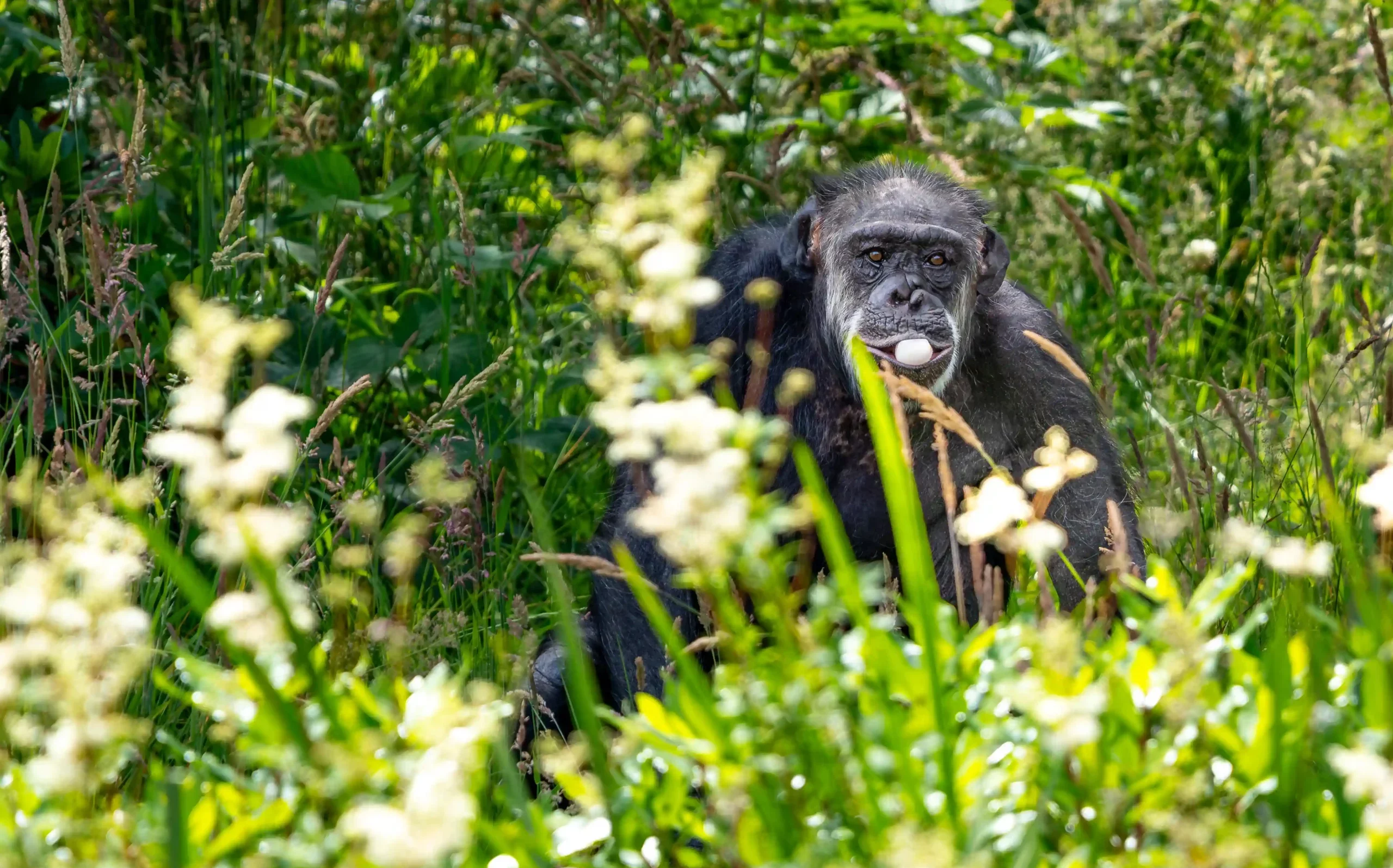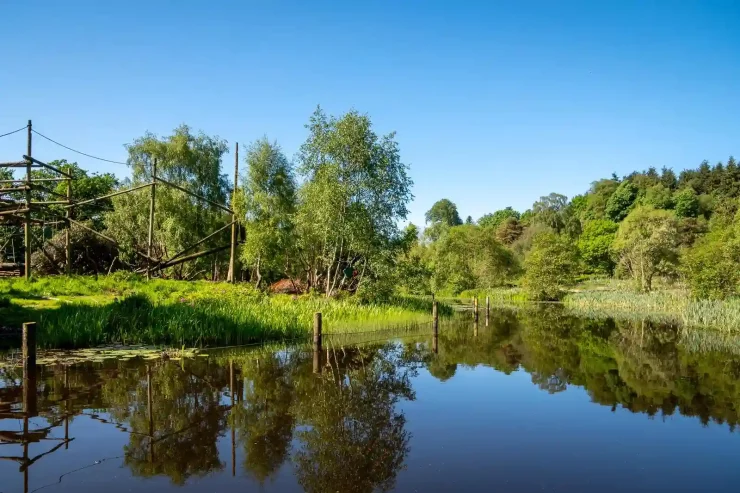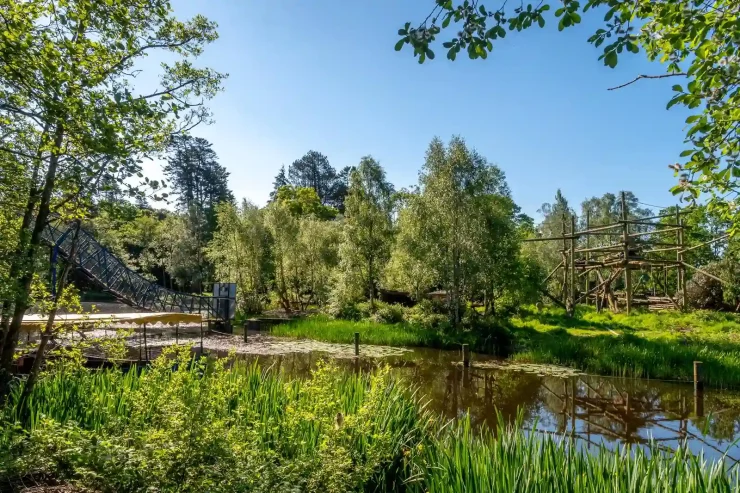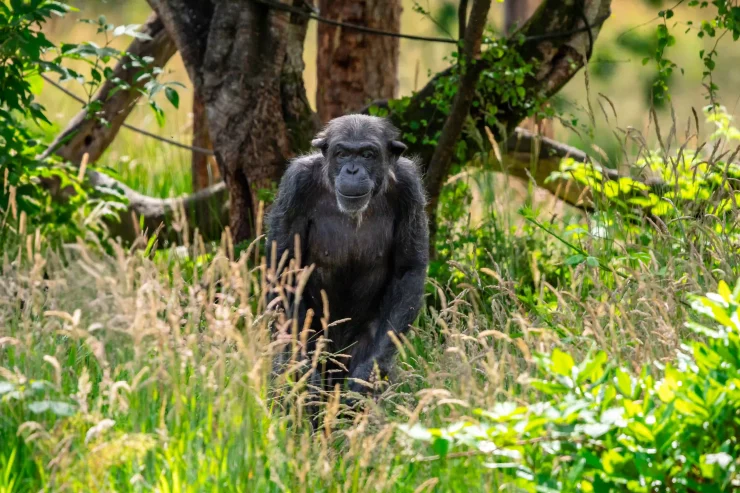
Our response
At Blair Drummond Safari Park, our three chimpanzees, Chippie (38), Gill (55) and Peter (33), live in one of the most spacious, enriching and naturalistic habitats in the UK. Their care is supported by expert veterinary oversight and regular, independent inspections, and we’re incredibly proud of the high standards we maintain. We know that the welfare of great apes in human care is a serious and sensitive topic – and one we approach with absolute commitment and transparency.
Chimp Island and our indoor chimp house were purpose-built to reflect the complex physical, emotional and social needs of chimpanzees. Our chimps are free to roam, forage and rest across a diverse, stimulating landscape that mimics the wild. They have near 24-hour access to their indoor space and their outdoor island via a bridge and can choose where to spend their time. Their care is led by an expert team with years of experience in primate husbandry – including fieldwork alongside wild chimpanzees in Africa.
This year, our facilities were subject to a full Zoo License Inspection and a Special Inspection focused solely on the chimp facilities and our suitability to house more chimps. Each of these two independent expert inspectorates produced glowing reports.
From the Special Inspection Report – Chimpanzee Pre-Import Review:
“The BDSP chimpanzee facility has both the sufficient space for a large troop and an extremely flexible working space which facilitates mixing of new chimpanzees.”
‘Based on these absolute sizes the BDSP enclosures are far in excess of the minimum recommendation by both the American and European zoo husbandry standards but also that used for sanctuaries when considering the current population of three chimpanzees.’
‘The use of climbing structures including all surfaces of the enclosures, and the variety is critical for the well-being of any great ape (Ross et al., 2011). BDSP fully embraces this principle with the walls turned into climbing walls, hanging structures, nests, fixed climbing, and embedded food enrichment are all part of the basic set-up of the house. These are all designed to maximise the three dimensional space, and BDSP is commended on the manner in which they have converted the facility to facilitate optimal use and enrichment.’
From our Zoo Licence Inspection Report:
‘The husbandry programmes are well planned and documented, taking into account areas where there might be difficulties, such as areas of potential conflict. The techniques used for elephant, carnivores and primates in particular meet these species need for more complex stimulation.’
‘Chimp enrichment is highly commendable, covering sensory, cognitive, physical, social, food and object manipulation scheduled over a week and avoids repetition using a wide palette.’
Our chimpanzees regularly engage in behaviours you’d expect to see in the wild – from grooming and playing, to foraging and even hunting small prey species that share their island habitat. They’re offered a varied and ever-changing enrichment programme that supports their natural curiosity, problem-solving and dexterity. Daily training sessions, using only positive reinforcement, allow our chimps to voluntarily take part in husbandry and health checks, ensuring veterinary procedures are stress-free and familiar.
We carry out monthly welfare audits, and behavioural observations consistently show that our chimps are relaxed, stimulated and socially bonded. They also have choice – a fundamental component of good animal welfare – in everything from where they sleep to whether they participate in training.
Managing social relationships is a vital part of chimpanzee life – and our facility is specifically designed to support that. The house can be separated into several connected areas, giving individuals the chance to take space when they need it or to choose who they spend time with. This flexibility mirrors the natural fission–fusion dynamics seen in wild chimpanzees and helps prevent social tension. Fortunately, our current group get on extremely well, but should any issues arise, there are multiple spaces available to support separation, and our team uses 24-hour CCTV to monitor behaviour and step in early if needed. The environment gives them the ability to manage their relationships on their own terms – just as they would in the wild.
Our chimps aren’t just animals we look after – they’re individuals we know intimately. Chippie, the dominant male, was born here at the park. He loves fresh veg, enjoys playing, and likes to be in charge. When we catapult food onto the island, he’ll gather as much as he can in one go, just so he can sit and enjoy it without having to get up again. Peter, who joined the group last year, was chosen specifically as a companion for Chippie because of his easy-going nature – he’s not interested in being the alpha. He’s a meticulous nest-builder and always on the move. Then there’s Gill, our oldest chimp at 55, who’s very much the queen of the group. The boys are constantly doting on her – you’ll often spot Chippie gently guiding her across the bridge with an arm around her shoulders. These close relationships are only possible because our keepers know them so well – their habits, personalities and preferences – and that understanding shapes every decision we make about their care.
We believe it’s important to assess welfare based on evidence, not ideology. While we respect the broader debate about the role of modern zoos, our focus is on the individual animals in our care. For our chimpanzees, that means a carefully designed habitat, tailored enrichment, and the care of a specialist team who know them well and are committed to giving them the best possible quality of life. It’s clear, from both professional experience and independent inspection, that these animals are thriving.
As part of our wider commitment to chimpanzee conservation, we also support the Bulindi Chimpanzee and Community Project in Uganda. Since 2014, we’ve donated over £62,000 to this initiative, which works to protect wild chimpanzees and support the people who live alongside them. The data collected through research also contributes to the global understanding of chimpanzee behaviour and welfare.
With wild populations under increasing threat from habitat destruction, hunting and human conflict, the role of well-managed zoos and safari parks has never been more important. Responsible institutions like Blair Drummond support conservation, education and research – while providing expert care for animals whose wild cousins are in crisis.





